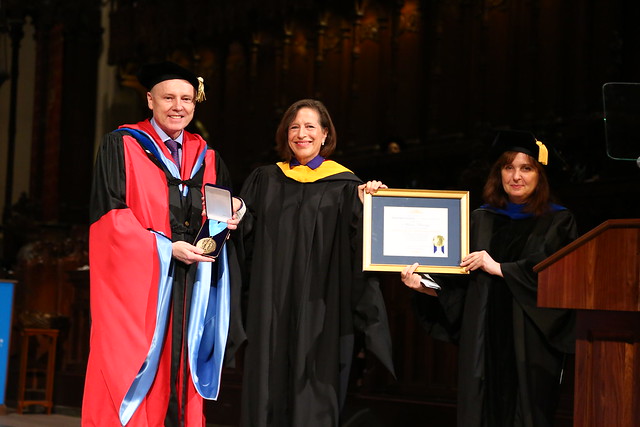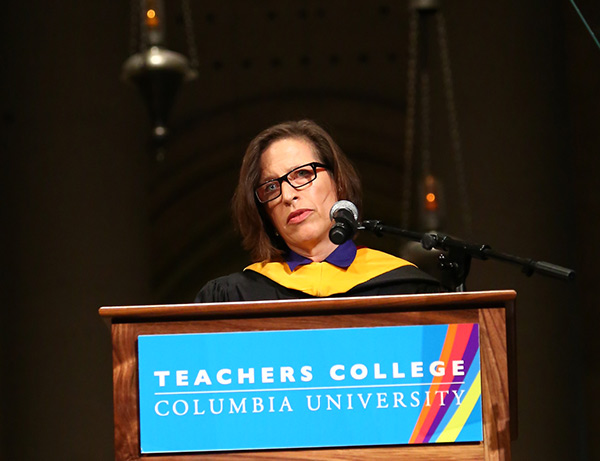Educating Against Extremism: At TC’s second master’s convocation, a call to build better futures for the world’s most vulnerable (yet most resilient) populations

Building peaceful, prosperous societies in areas of conflict or disaster is “the single most important thing we can do to stem the tide of extremism,” Melissa Fleming, chief spokesperson for the UN Refugee Agency (UNHCR), told graduates at the second of TC’s three master’s degree ceremonies.
Fleming, who also is senior adviser to the UN Secretary General and recent author of A Hope More Powerful Than the Sea: The Journey of Doaa Al Zamel: One Refugee's Incredible Story of Love, Loss, and Survival (Flatiron Books, 2017), called refugees “among the most vulnerable people on earth” but “also the most resilient.” While graduates might be told that their “future is now,” she said, refugees forced to “send their child to work in a potato field instead of to school” often reject that notion. Or as one young refugee, who showed Fleming his diploma, carefully wrapped in silk, put it: “Without my education, I am nothing.”

Graduates at Tuesday’s ceremony, representing the departments of Biobehavioral Sciences, Counseling & Clinical Psychology, Education Policy & Social Analysis, and Health & Behavior Studies, will work on a variety of fronts to help all marginalized people “exercise and enjoy the privileges of citizenship,” said TC President Susan Fuhrman, adding that “the important work that all of you are doing in pursuit of social justice and advancing civic education is very much at the core of what makes TC great.”
Fuhrman shared the stories of graduates Cindy Wiltshire, a veteran New York City teacher who has been working in TC’s Neuroscience & Education program with Professor Kimberly Noble, and Counseling & Clinical Psychology student Mack Exilus, who came to his field through acting.
“The important work that all of you are doing in pursuit of social justice and advancing civic education is very much at the core of what makes TC great.”
— TC President Susan Fuhrman
Wiltshire will “use her research to help create economic, social, and education policies that could reduce inequity and improve the health and well-being of millions of future citizens,” Fuhrman said. Exilus is fighting “the stigma against mental health care, as well as disparities in access, that prevent many African Americans from seeking the treatment they need – even though exposure to racism, discrimination, poverty, and violence make urban African American communities among the most prone to psychological distress.”
For many at TC, efforts to help others begin with self-scrutiny and self-healing. Student speaker Kenya Crawford,receiving her master’s degree in Counseling Psychology, recalled that when she first arrived at TC, she struggled with “imposter syndrome.”

“This is where I learned my first lesson of ‘leaning,’” said Crawford, who served variously as Co-Director for TC’s Sexuality, Women, and Gender Project, a research assistant in the Stigma, Identity and Intersectionality Lab, and Co-Coordinator for the College’s 37th annual Winter Roundtable. “I had to challenge the Superwoman stereotype and reframed my relationship with vulnerability. I learned that my strength emits from the energy gained from those around me. With such support I am grateful enough to stand here with you all cancer free with a few extra letters after my name.”
Crawford said she absorbed two other essential lessons: the importance of lifelong learning and the imperative for self-love. “I’ve learned the importance of flaunting the masterpiece that is you. Do not denounce your essence and label it as humility. Today I challenge you all to no longer silence your greatness.”
Related Stories
Published Tuesday, May 16, 2017